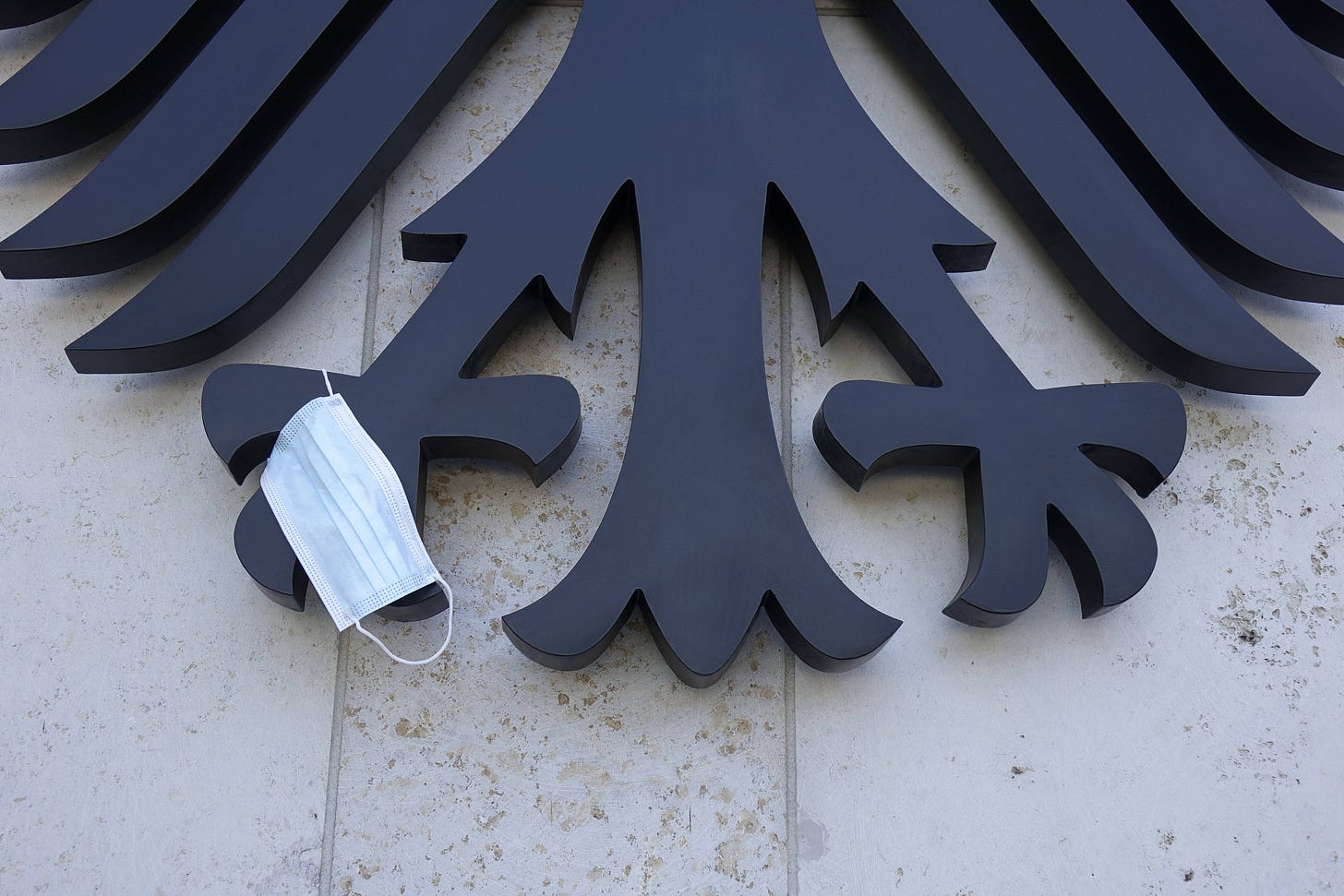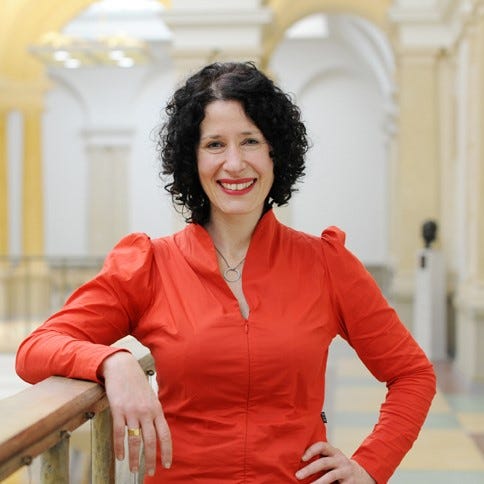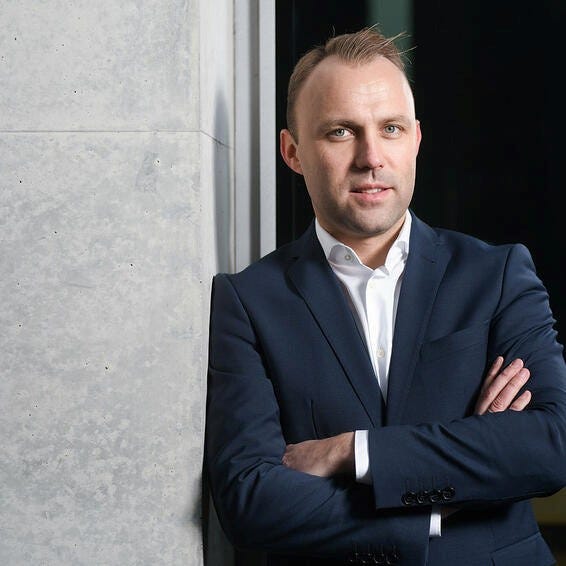#5: Triell, tech €€, hackers, election
The news is either corona, elections or both.
Be careful when walking on fallen autumn leaves, they might be hiding something.
Hey Berliners,
did you watch the second Triell (truell in English, apparently) Sunday night? The three top candidates for chancellor - Olaf Scholz (SPD), Annalena Baerbock (Die Grüne) and Armin Laschet (CDU) locked horns over climate, health, pensions, industry, immigration. To be honest, they more or less agree on most of these issues. It’s just a matter of shifting the emphasis here and there. With the SPD you’ll get a slightly higher minimum wage, with the Greens a slightly more agressive climate policy, with the CDU…. well, you’ll get the CDU.
Actually, there was at least one thing they actually disagreed about: whether or not to phase out Germany’s two-tier health insurance system. Scholz and Baerbock want a single public Bürgerversicherung we would all pay into, while scrapping the private health insurance that 8 million people enjoy (or are trapped in). Another difference: SPD and Greens want to re-instate a tiny wealth tax for the richest of the rich to help pay for investment in schools, climate measures, infrastructure.
At the end of the day, one has the feeling the personal qualities of the candidates play a greater role than anything else. Laschet comes across as too nervous. His smile is slightly odd. And people dislike Baerbock’s voice (thinly cloaked sexism?). That leaves Scholz, whose popularity is largely due his ability to maintain a Zen calm, no matter what you throw at him. Making him the candidate most like level-headed Angela Merkel - whom Germans supposedly already miss.
So the debate did nought to sway voters. Scholz is still ahead of Laschet by 5 or 6 percentage points.
But let’s face it, it’s hard not to feel a little Schadenfreunde over the rapid demise of the CDU - after 16 years at the helm they’ve gotten just a little too cocky. Four years in the opposition would do them some good.
Of course, this is Germany and the real fun begins after the election and the weeks of coalition talks. The CDU as a junior partner in the next government is a distinct possibility. More spannend than your average Tatort, so that’s something.
More on local candiates below!
Maurice & Andrew
p.s. If you like what you’re reading, please share 20 Percent Berlin!
Berlin corona stats for Tuesday, September 14
Fully vaccinated: 62.2%
New cases in one day: 761 (541 Friday)
Total deaths: 3,607 (+5 over Friday)
🟡 7-day Covid-19 incidence: 85.2 (84.7 Friday)
🟢 7-day hospitalization incidence: 1.4 (1.4 Friday)
🟡 Covid-19 ICU patient occupancy: 7.3% (7.5% Friday)
Source:
Berlin’s corona information page
2G debate
Unhappy with the sluggish vaccination rate and the prospect of a Delta-driven fourth wave in the autumn, leaders in Berlin and the surrounding state of Brandenburg are seriously discussing implementing a 2G rule for certain activities, meaning people who are geimpft (vaxxed) or genesen (recovered) could enjoy access to more activities such as indoor events. A negative corona test would no longer suffice. But politicians are treading carefully as the issue remains a legal minefield.
Hackers target Berliner conspiracy theorist
Hacker group Anonymous took control of various online channels belonging to far-right Holocaust denier, corona denier and former celebrity vegan chef Atila Hildemann, reports AFP. An Anonymous banner appeared on Hildemann’s main site Monday. Hildemann’s former IT administrator apparently passed on info to the hackers, who also hijacked his blog and popular Telegram channel. Hildemann, who is being investigated on 80 criminal charges, including incitement of hatred, is believed to have fled Berlin for Turkey.
Tech sector: more money, more jobs
A mere decade or so ago, Berlin was basically a shabby-chic settlement in the far east of Germany best-known for its mass unemployment and cheap rents. No more! Thanks mostly to tech, the economy is flourishing. Despite corona, 42,400 jobs were created between June 2020 and June 2021, according to a report by Berlin’s Economy Minister Ramona Pop (Greens). In the first half of this year, 20,691 companies were founded (in all sectors). And, according to EY’s start-up barometer, German start-ups attracted €4.1 billion in the first 6 months of this year. Half of that went to Berlin, a new record. Just two weeks ago, Google said it was pumping €1 billion into Germany, most of it into a massive cloud data centre in the Berlin region.
Berlin buys 14,000 flats
Three government-owned property companies Friday will sign an agreement to buy 14,000 apartments from über-landlords Vonovia and Deutsche Wohnen for €2.4 billion, according to the Tagesspiegel. The deal is being sold as politicians doing all they can to get rents under control but the landlords actually offered the apartments to curry political favor for Vonovia’s stumbling attempt to buy Deutsche Wohnen for €19 billion. The SPD, which controls Berlin’s finance ministry, loves the agreement but all the other parties say there’s a lack of transparency. No one knows where or what the flats are. So no, you can’t rent one yet (or maybe you already are).
Did you know …
… more people lived in Berlin in 1910 (3.7m), 1913 (4m) and 1933 (4.2m) than now (3.7m)? Imagine the lines at Mustafa’s in 1910!
Elections: The top mayoral candidates at a glance
With all eyes on who will replace Merkel, it’s easy to ignore the other votes on September 26. The Berlin state parlimentary election will decide who becomes “governing mayor” (is there a non-governing mayor?). Current mayor Michael Müller (SPD) is stepping down. Here are the top contenders.
Franziska Giffey (SPD) Former federal family minister and ex-mayor of Neukölln, Giffey is now best known for plagarizing massively in her PhD thesis, which was officially revoked by FU Berlin in the spring. The scandal has hardly stuck to her, as she remains the forerunner. It’s hard to know what she stands for other than more kindergarten spots. Fun fact: she did an internship with the Labour Lewisham council leader David Sullivan in 2000. Polling at 25%.
Kai Wegener (CDU) Originally from Spandau, Wegener is definitely an outside-the-ring sort of candidate. Very much a centrist who promises all things to all people. In this election campaign, he’s been pimping up his green credentials, though. Why? If he manages to beat Giffey, he’s open to a coalition with the Greens. Polling at 16%
Bettina Jarasch (Die Grüne) A former journalist, Jarasch is considered a realo among the Greens, i.e. in favour of a pragmatic approach. She’s ruffled the feathers of national candidate Annalena Baerbock by showing support for the referendum for expropriating large landlords in Berlin that is also being held on election day. And she triggered a shitstorm at a Green conference this year for saying she wanted to be an “Indian chieftain” when she was a kid. Polling at 17%.
Sebastian Czaja (FDP) A classic Free Democrat: cutting red tape, digitalisation, education are apparently his thing. In the real world, though, he made a splash with campaigns to keep open Tegel Airport and open Tempelhof to construction, which didn’t particularly endear him with the locals. Polling at 7%.
Klaus Lederer (Die Linke) As culture minister under Michael Müller, Lederer has been able to enjoy the limelight. He was widely praised for his handling of the cultural crisis during corona - which basically consisted of ensuring cultural institutions and individual artists and performers received special funding to see them through the pandemic. He’s occasionally been accused of not placing sufficient emphasis on addressing the negative aspects of the former East Germany. Polling at 16%.
Kristin Brinker (AfD) What can we say about the candidate for the far-right AfD? Here she is, which means we’ve already said too much. The party has vowed to make Berlin “normal” again. Again? Snowball’s chance in hell. Still polling at a frightening 15%.
That’s it for now. See you Friday.










That 15% polling for the AfD candidate is frightening. Not very reassuring for foreigners such as myself :(